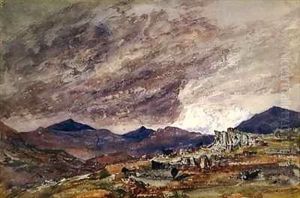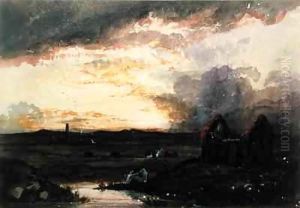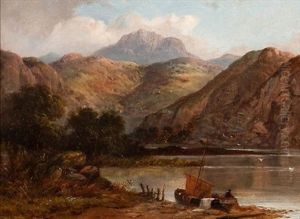Barbara Leigh Smith Bodichon Paintings
Barbara Leigh Smith Bodichon was a prominent figure in the 19th century, known for her significant contributions to women's rights and education, as well as her work as an artist. Born on April 8, 1827, in Whatlington, East Sussex, England, she was the eldest daughter of Anne Longden, a milliner and radical, and Benjamin Leigh Smith, a wealthy Whig landowner and political reformer. Bodichon grew up in an environment that encouraged education and intellectual debate, shaping her progressive views on women's rights and social reform.
Bodichon's early life was marked by her unconventional upbringing, where she was educated at home and exposed to political and social discussions. This foundation laid the groundwork for her later activism. In 1854, she published 'A Brief Summary in Plain Language of the Most Important Laws Concerning Women,' a pamphlet that highlighted the legal inequalities faced by women, and became a cornerstone of early feminist literature.
As a co-founder of the Langham Place Circle, a group of like-minded women who advocated for women's rights, Bodichon worked tirelessly to improve women's access to higher education and professional employment. She played a crucial role in the establishment of Girton College, Cambridge, the first residential college for women in England, demonstrating her commitment to expanding educational opportunities for women.
In addition to her activism, Bodichon was an accomplished artist. She studied painting and frequently traveled, capturing landscapes and scenes that reflected her keen observation and vibrant use of color. Though her artistry is often overshadowed by her reform work, her paintings were exhibited at the Royal Academy and other prestigious venues, showcasing her talent and passion for the visual arts.
Bodichon's personal life also reflected her progressive beliefs. In 1857, she married French physician Eugène Bodichon, but maintained her independence, continuing her work and keeping her own surname alongside her husband's. The couple divided their time between England and Algeria, where they owned property. Bodichon's health began to decline in the 1870s, yet she remained active in her advocacy work as much as possible until her death on June 11, 1891, in Robertsbridge, East Sussex.
Barbara Leigh Smith Bodichon's legacy is profound, spanning the realms of women's rights, education, and art. Her pioneering efforts paved the way for subsequent generations of women to pursue equality, education, and professional careers. Despite the challenges of her time, Bodichon's work and convictions left an indelible mark on the struggle for women's suffrage and rights in Britain.


